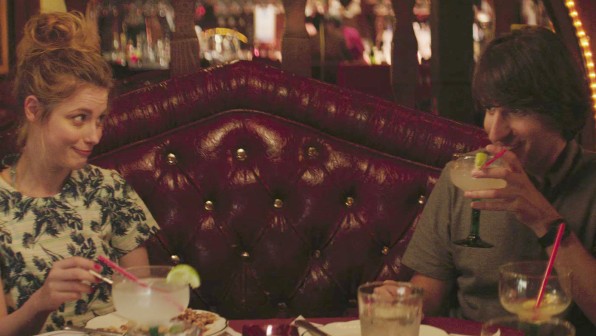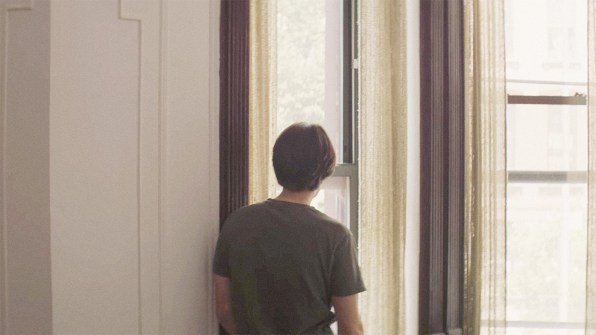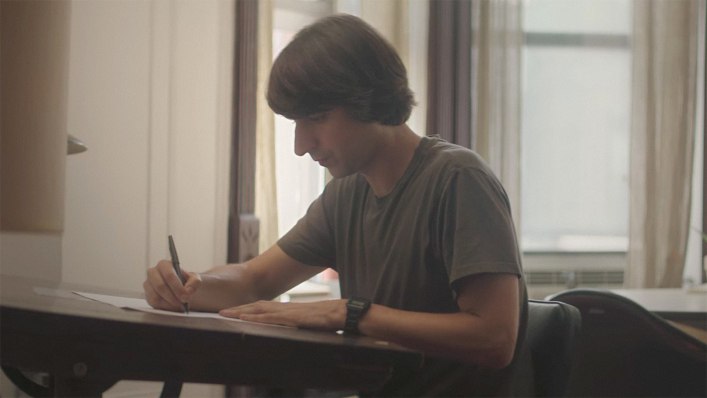Demetri Martin Made This Movie To Tell a Story The Way He Couldn’t Onstage
Next week will see the release of Jim Carrey’s I’m Dying Up Here on Showtime, a sleek series about the LA standup scene in the ’70s. The well-reviewed show joins Pete Holmes’s Crashing on HBO, an autobiographical hit from earlier this year that thinly veils the comedian’s origin story, along with Sleepwalk With Me, the indie from 2012 in which Mike Birbiglia’s fictional counterpart finds his voice. At this point, the metamorphosis in which a standup emerges from its joke-engorged cocoon has been thoroughly, albeit entertainingly, demystified. So, it should be somewhat refreshing that when veteran standup Demetri Martin set out to tell a cinematic story drawn from his own life, he chose a different part of his life. But that’s only one of the reasons the resulting film, Dean, marks his biggest step yet beyond the world of standup.
“I love standup but it doesn’t usually tug on my heart the way a good movie can,” Martin says. “Great standup makes me laugh and some of them—like Tig Notaro—really put it all out there. I don’t know how to do that. Someday I’ll figure it out, but I thought maybe with a movie I might be able to do that now.”
Rather than pathos, Demetri Martin is known for making short, punchy jokes in different mediums. Indeed, when Fast Company first interviewed him, the topic was how to express oneself more succinctly. When he’s not performing brief deadpan bits, or setting them to song, or sketching them out on a giant notepad, he’s putting them on the page with a collection of short essays and another of his signature illustrations. It’s this last mode in which he chose to place the lead of his film. The titular Dean of Dean, which is playing in select theaters now, is an illustrator working within an extremely Demetri-like comedic milieu, who can’t seem to follow up his first book or move past his mother’s death. Although the exact situation is fictional, there’s a lot of Martin in the character, which he wrote, directed, and plays himself, as a means of finally telling a not-so-short story.
In the late ’90s, Demetri Martin dropped out of law school to embark upon his career as a comedian. Within five years of steadily increasing success, he began to consider taking the Woody Allen/Albert Brooks route of transitioning from telling jokes to making films.

“It’s like, first you develop your sensibility as a standup and then you can maybe apply it in different ways,” he says.
Martin soon started experimenting with screenplays, and he managed to sell a couple of them. Will was a cerebral comedy about destiny. It was set in a world with a production level located just above earth, where sunsets and wind and bugs are created, and everyone’s life below is basically a movie. Another script, Moon People, proposed that NASA had secretly colonized the other side of the moon in the 70s, and left some people up there… until they end up coming back to present-day Earth.
They were stories brimming with the kind of imagination and fanciful logic that comprises Martin’s jokes. Neither film ever got made.

“After a while of naively hoping someday it would happen, I figured I gotta just do this myself,” Martin says. “I decided to write a movie for me to direct because I wanted to tell a story the way I wanted to tell it.”
At his wife’s urging, he abandoned the high-concept path and headed toward more of a personal, partly autobiographical story. Once he developed the script, Martin was able to find funding and attract a stacked cast, including Kevin Kline, Gillian Jacobs, and Mary Steenburgen. Although he had no experience behind the camera, he did a lot of on-the-job learning through collaboration and created an assured debut that feels more like a second or third film from an emerging talent.

The most striking aspect of Dean is how seamlessly Martin’s comedic voice is integrated into it. Some of the character’s musings sounds like the actual comic’s jokes, his outgoing voicemail (“Here’s my best impression of a robot: [beep]”) feels like something he might have done at one point (though he claims it isn’t), and the drawings are especially useful for injecting idiosyncratic levity into a sometimes sad story.
Making the character Dean an illustrator allowed Martin to fill a lot of screen real estate with artistic interpretations of Dean’s thoughts, along with some of the punchline-packing panels he’s drawn. Some of these drawings predated the movie, and many others Martin had to force himself to create when the scene called for a funny doodle. (By the time the movie was finished, Martin had enough surplus illustrations to complete a new book of drawings, scheduled for release later this year.)

One scene in the film, however, best translates the style-switching energy of Martin’s live act into the film medium. During a dinner scene, Dean pitches an invention called The Baby Silencer to his love interest (Gillian Jacobs). The concept of a baby silencer could work as a joke told onstage, or an illustration on a giant notepad. The audience gets both versions here, complete with a perfect tag to the joke in the form of Jacobs’s reaction. It’s like seeing a performer used to spinning each plate one at a time suddenly spin them all at once, and it’s dazzling.
“I’ve always liked the game of presenting things in slightly different formats and seeing if you can get them to work together,” Martin says. “One of the most exciting things about filmmaking for me is that you get to do exactly that.”
“Dean” is the personal, assured film debut of comedian Demetri Martin, who figured out how to transfer his sensibilities to a new medium.
Next week will see the release of Jim Carrey’s I’m Dying Up Here on Showtime, a sleek series about the LA standup scene in the ’70s. The well-reviewed show joins Pete Holmes’s Crashing on HBO, an autobiographical hit from earlier this year that thinly veils the comedian’s origin story, along with Sleepwalk With Me, the indie film from 2012 in which Mike Birbiglia’s fictional counterpart finds his voice. At this point, the metamorphosis in which a standup emerges from its joke-engorged cocoon has been thoroughly, albeit entertainingly, demystified. So, it should be somewhat refreshing that when veteran standup Demetri Martin set out to tell a cinematic story drawn from his own life, he chose a different part of his life. But that’s only one of the reasons the resulting film, Dean, marks his biggest step yet beyond the world of standup.
Fast Company , Read Full Story
(57)














